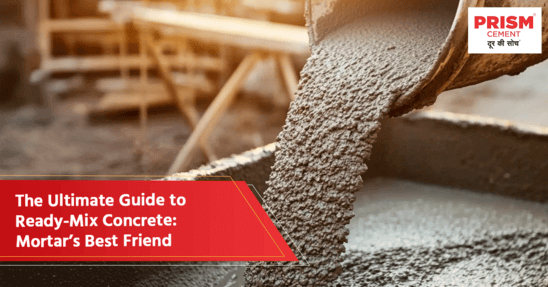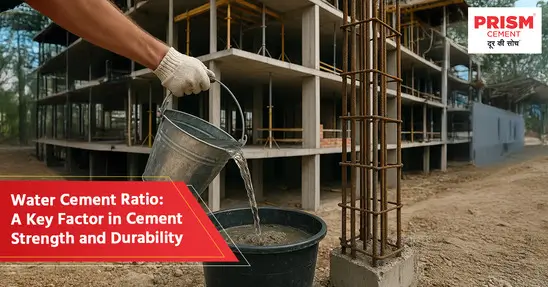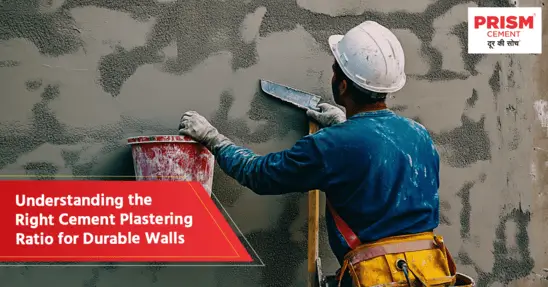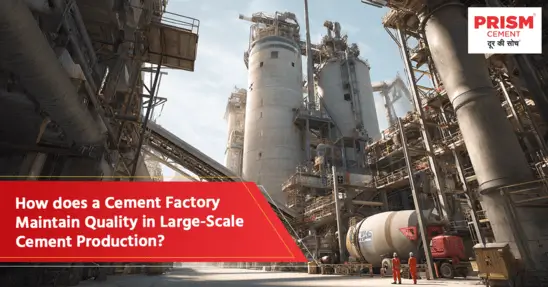When it comes to construction, two materials often get confused—ready mix concrete and mortar. While they may seem similar, they serve very different purposes. Whether you're laying bricks, building walls, or pouring foundations, choosing between cement vs. mortar is crucial for a strong and durable structure.
So, what exactly is the difference between concrete and mortar? And which cement is best for concrete? Let’s break it down in the simplest way possible, so you can make the best choice for your project.
At Prism Cement, we provide high-quality cement solutions tailored for every type of construction, ensuring strength and longevity.
Key Differences Between Concrete and Mortar
Many people use the terms concrete and mortar interchangeably, but they are not the same. Here’s how they differ:
| Feature | Concrete | Mortar |
|---|---|---|
| Composition | A mix of cement, sand, gravel, and water | A blend of cement, sand, and water (no gravel) |
| Strength | High strength, used for load-bearing structures | Lower strength, primarily used for bonding bricks & blocks |
| Best For | Foundations, slabs, driveways, bridges | Bricklaying, plastering, repairs |
| Durability | Long-lasting, resistant to weathering | Less durable, requires maintenance over time |
Simply put, ready mix concrete is for building strong structures, while mortar is used for binding and finishing. If you're unsure which one to use, keep reading!
Choosing the Right Material for Your Project
Selecting between cement vs. mortar depends on your project type.
- For structural strength → Use ready mix concrete because it includes gravel and has superior durability
- For bricklaying or plastering → Choose mortar, as its smooth texture creates strong bonds between bricks
- For high-strength applications → Consider PPC Cement, which enhances concrete’s performance
At Prism Cement, we help you find the best cement solutions to match your specific construction needs.
What is Mortar?
Mortar is a smooth paste made of cement, sand and water, designed to hold bricks and stones together. It’s not as strong as concrete, but it’s essential for masonry work.
Mortar’s key uses include:
Bricklaying – Forms a strong bond between bricks and blocks
Plastering – Provides a smooth finish on walls and ceilings
Repairs – Used for patching cracks and small fixes in construction
Although mortar plays a critical role in masonry, it should not be used for heavy load-bearing structures—that’s where ready mix concrete comes in.
What is Concrete?
Concrete is a mix of cement, sand, gravel, and water, making it one of the strongest building materials available. Unlike mortar, which only bonds bricks together, concrete forms solid structures that can support heavy loads.
Best Uses of Ready Mix Concrete:
✔ Building foundations & slabs – Essential for stability
✔ Bridges & roads – Long-lasting and weather-resistant
✔ Driveways & walkways – Strong enough to handle daily wear and tear
Wondering which cement is best for concrete? The answer depends on the project. PPC Cement is ideal for large-scale applications, as it provides better durability and moisture resistance.
Applications & Best Practices
To ensure long-lasting construction, follow these best practices:
Use High-Quality Cement – The quality of cement solutions determines the strength of your structure
Choose the Right Mix – Mortar for bonding, concrete for strength
Proper Curing – Concrete needs time to gain full strength—at least 7 to 28 days of curing
At Prism Cement, we provide top-quality cement solutions, ensuring durability and efficiency in every project.
Conclusion
Now that you understand the difference between concrete and mortar, you can confidently choose the right material for your construction needs.
Use Ready Mix Concrete for foundations, driveways, and heavy-duty applications
Use Mortar for bricklaying, plastering, and finishing work
Choose PPC Cement for extra durability in concrete applications
At Prism Cement, we help you find the perfect cement solutions for every project. Whether you're laying bricks or pouring foundations, trust Prism Cement for strength and reliability.
Frequently Asked Questions (FAQ)
Q1. What are the key differences between concrete and mortar?
Answer: Concrete is made of cement, sand, gravel, and water, making it stronger and suitable for load-bearing structures. Mortar, on the other hand, is made of cement, sand and water and is used for bonding bricks.
Q2. Which is more suitable for bricklaying, concrete or mortar?
Answer: Mortar is better for bricklaying because it has a smooth texture that helps bond bricks together. Concrete is too coarse for this purpose.
Q3. How does the strength of mortar compare to concrete?
Answer: Concrete is much stronger than mortar because it contains gravel, which increases its compressive strength.
Q4. Can mortar be used in place of concrete for construction?
Answer:No, mortar is not strong enough for heavy load-bearing structures. Always use ready mix concrete for foundations and slabs.
Q5. What are the specific ingredients used in mortar that make it different?
Answer: Mortar is a mix of cement, sand, and water. Unlike concrete, it does not contain gravel, making it less strong but ideal for bonding bricks and blocks.




